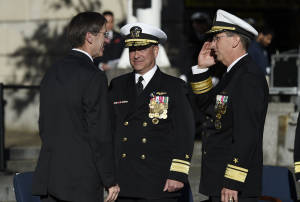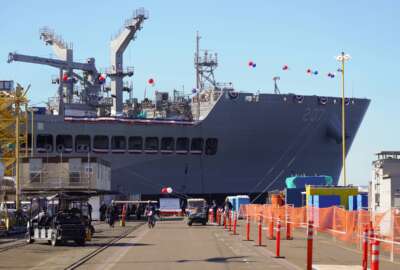‘The future is here today’ at ONR
When Rear Adm. Matt Winter, outgoing Chief of Naval Research, looks back on his career at the Office of Naval Research, the thing he is most proud of isn’t a new...
When Rear Adm. Matt Winter, outgoing Chief of Naval Research, looks back on his career at the Office of Naval Research, the thing he is most proud of isn’t a new technology or capability. It’s not any particular scientific advancement.
“The thing I’m most proud of, and our biggest accomplishment is the continued awareness, promotion, development and supporting of arguably the best and brightest scientists in the world,” Winter said in an interview during his final week on the job with Federal News Radio’s Jared Serbu.
In fact, Winter said 63 Nobel Prize laureates have been involved with ONR. Yet he is very aware of the technological advancements that have come out of his office.

“As the 25th chief of Naval Research, I’m honored and humbled to be the steward of this leadership position when we do celebrate this 70th anniversary,” he said. “Starting back on Aug. 1, 1946, when President Truman signed us into law, we’ve had a phenomenal string of technical, scientific and transitional technology accomplishments. Things like radar, sonar and nuclear propulsion.”
He said intelligence systems research, including the first fully digital computer, came out of ONR, as well as research into robotics and autonomous vehicles, especially the algorithmic phenomenology.
“Laser weapons, laser cannons, things that seem to be the future are here today based upon some of our incredible scientists’ work,” Winter said.
One of the most ubiquitous discoveries to come out of ONR is the Global Positioning System. GPS relies upon precise timing, and stems from the technology used to develop the atomic clock, which was made possible by ONR experiments with cooling atoms and measuring their movements.
And that’s the perfect example of basic research leading to huge applications that Winter believes is at the heart of ONR’s mission.
“I am a big advocate for continued focus on basic research,” he said. “That basic research that generates the new ideas, the innovative discoveries, the knowledge that only God knew yesterday that we now know today is truly that corpus of knowledge that allows the engineers and other scientists to look at applications to bring forward. And without that basic research, someday you’ll have a cavitated pump, and have nothing to draw upon to have application and basic research.”
ONR generates almost 400 patents a year, he said, many of which exist in the software domain.
Winters said that the business of science is largely what restrains scientific advancements. Contracting, procurement and other red tape can slow down research and stymie innovation.
“The speed of execution of has a number of barriers,” he said. “The biggest one is — I call it a time tax. From the time that somebody comes up with a good idea or comes up with a requirement that we know we want to pursue, we have an inordinate amount of ‘go-and-no-go’ processes and authorities that we need to navigate through to get to what I call the ‘yes,’ which allows us to just start the work.”
ONR has made it somewhat easier, he said, by consolidating numerous authorities, including the head of contracting, resource management, legal authorities and final decision on stopping and starting projects under a single commander.
“By providing that to a single commander who has the authority, but also the accountability to show the relevance and the outcomes, we’ve been able to increase the amount of projects with the same amount of dollars, increase our partnerships with our industry and academia performers that do that work with us, so that we can truly increase the outcomes,” Winter said.
He said that leadership needs to be active in this way, especially for organizations attempting to innovate and create. There needs to be a central awareness of projects and capabilities to avoid duplication.
Copyright © 2025 Federal News Network. All rights reserved. This website is not intended for users located within the European Economic Area.
Daisy Thornton is Federal News Network’s digital managing editor. In addition to her editing responsibilities, she covers federal management, workforce and technology issues. She is also the commentary editor; email her your letters to the editor and pitches for contributed bylines.
Follow @dthorntonWFED






